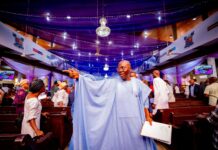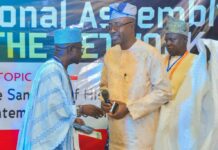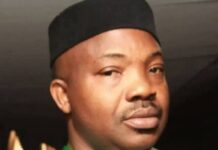
A Book review by Drew Povey
Author: Adam Mayer
Title of Book: “Naija Marxisms – Revolutionary Thought in Nigeria”
Publisher: Pluto Press.
Place of Publication: London:
Date of Publication: 2016.
If you are angry about the current state of global society, especially if you are Nigerian, you should read Naija Marxisms to learn important lessons from whose who struggled against similar challenges. As Isaac Newton said, we can see further because we stand on the shoulders of giants. This book provides you with access to the thoughts of the giants of Nigerian Marxism.
In the first chapter, Adam starts with a defence of why a study of the history of socialist ideas in Nigeria would not make important and gripping reading. This was before Bernie Sanders won 23 states in the Democratic primaries in the US and Nigeria experienced its tenth general strike since the end of military rule (in 1999) in May of this year.
Nigeria is the largest economy in Africa and around one in five Africans are Nigerian. Despite the oil wealth, most of the people are poor with around 60% of the population having to exist on around a dollar a day. This level of inequality creates a high degree of anger and many Nigerians are searching for an alternative. Some turned to Boko Haram, especially in the far north east – others turned to the Shiite Islamic Movement of Nigeria who were mascaraed by the army in December 2015. In the south east many have turned to the separatist politics of Biafra – and have also faced state repression.
But Marxism is deep within the labour movement which unites Northerners and Southerners, Muslim, Christian and traditional workers. When this movement is aroused the whole country stops – as last happened in January 2012. This involves the organised workers, predominantly in the public sector, but also much wider layers of the urban masses: the informal workers, area boys and market mamas. For millions of Nigerians Marxism provides a guide that they turn to in their hour of need – it is also a living creed which is endlessly debated and discussed at the Harmattan and Rain Schools of the main trade union centre, the Nigeria Labour Congress, and also at the regular meetings and symposia of local socialist groups.
Naija Marxisms are not only important for the working class in Nigeria, but also for their sisters and brothers across Africa and the world. If Marxism is to be successful it has to absorb the lessons from the working class movement across the world. This book provides a guide to one of its more vibrant and numerous strands.
Mokwugo Okoye, Edwin Madunagu, Eskor Toyo, Bene Madunagu, Ola Oni, Bade Onimode, Molara Ogudipe, Tunji Otegbeye, Niyi Oniororo, Ikenna Nzimiro, Yusufu Bala Usman, Amina Mama, Igho Natufe, Wahab Goodluck, or the early Adebayo Olukoshi are some of the Marxist authors that Adam introduces and discusses.
The author is a young Hungarian historian and so has an interesting perspective on the many Nigerians who gained scholarships in his and other countries of what was then the Communist Block. He defines Marxism widely and inclusively, but shows sympathies with traditional communist views rather than the broadly Trotskyist views of writers such as Eskor Toyo or Edwin Madunagu.
Adam provides a potted history of the left and the trade union movement in Nigeria. Since at least the mid 1940s, Marxism as been an important current in the fight against colonialism, within the trade unions and the feminist and student movement. In the first half of the 20th century, the Nigerian economy was dominated by European firms (UAC, owned by the Anglo-Dutch company Unilever, controlled 40% and six other firms controlled another quarter of exports) and the government. As such the anti-colonial movement was a fight against both colonialism and the main employers of formal labour. In contrast now, although international firms are still important (especially in the key oil sector) the main employers are now the indigenous governments (Federal and state) and local companies (the larger ones of which now have a regional or continental reach).
The first trade union (for civil servants) was established in 1912 and interestingly led by Henry Libert, originally from Sierra Leone. A subsequent strike in 1921 successfully stopped an attempt to reduce wages. With this background, the first Marxist inspired party, the African Workers Union of Nigeria was established in 1931.
As part of the post-war radicalism, the first general strike took place in 1945 and the mass nationalist Zikism Movement started the following year. The general strike lasted for 44 days in Lagos and closed down everything except electricity generation and the hospitals. Zikism relied heavily on trade union leaders. Its field secretary, Nduka Eze went on to lead a major strike at UAC in 1949 the first leader of the trade union movement, Michael Imoudou was also a member.
With independence in 1960, the trade unions had to take on the government. There was another general strike in 1964 against preventive detention. In the 1970s further restrictions were introduced on trade union activities and in 1978, the military government merged the trade unions to form the Nigeria Labour Congress (which remains as the largest trade union centre). The radical trade union leaders including Michael Imoudou, Wahab Goodluck and Samual Bassey were purged.
Buhari, the current president of Nigeria, then the military leader introduced anti-labour decrees in the early 1980s. This was followed by the Structural Adjustment programme of the mid-1980s with deindustrialisation, wage cuts and attempts to reduce the fuel subsidy. There were fight backs with the 1981 strike for a minimum wage and a pro-democracy general strike in 1994. However, the current strike wave continued and expanded after the end of military rule in 1999.
Student protests grew with the extension of university education in the 1960s. By the 1970s it was considered nearly as significant as the trade union movement. This gave birth to a layer of Marxist intellectuals including Ola Oni, Eskor Toyo and Eddie Madunagu. Despite their criticism of the Soviet Union, Nigerian socialists lost an important financial and ideological external backer with the collapse of ‘communism’ from 1989. The organised left is now a shadow of its former self. Despite this at least two small Marxist groups the Democratic Socialist Movement (from 1987) and the Socialist Workers League (from the 1990s) continue. Larger progressive organisations have included the National Conscience Party, the Democratic Alternative and the Labour Party.
Adam also deals with international relations and the Nigerian left. Whilst the elite of the country clearly looked to the US, socialists looked to other Africans such as Amicar Cabral (Cape Verde) or Joe Slovo (South Africa) or to figures such as Angela Davis, an African American.
The cold war led to a division across Africa between governments looking to the US and those turning to Russia and China. In the later case, Marxist theories became distorted by the particularly requirements of the Russian state and so an emphasis was placed on economic development and alliances with the so called ‘progressive’ bourgeoisie.
Russia provided arms to the Federal Government during the Biafran war (1967-1970), some aid for capital projects, for example, the Ajaokuta Steel Mill and supported many students studying in Russia and Eastern Europe. Despite this, the Nigerian government turned its back on the East after the war and in 1976 three leading trade unionists were indicted for “acting in the interests of a foreign power”.
In the main body of his book, Adam provides the background ideas and key publications of many leading Nigerian socialists.
Niyi Oniororo (died 2005), for example, was Ola Oni’s brother, but much more favourably inclined to the so called socialist states. He quoted George Bernard Shaw on taxing the rich and criticised other socialists from the late 1970s for just searching after money.
Ikenna Nzimiro (died 2006) was an anthropologist and a high-ranking Biafran civil servant, but critical of the political leadership who he saw as being elitist and hierarchical. He saw the conflict as “a class conflict within the [Nigerian] ruling classes” (page 111) which had been made worse by colonialism. This had preserved and strengthened traditional structures and exaggerated ethnic differences.
Yusufu Bala Usman (died 2005) was against English imperialists, but mainly used their language for writing. He left the Peoples Redemption Party – PRP (the main northern progressive party) in 1999 and turned against the southern Yoruba. He recognised that the main beneficiaries of the status quo were the Nigerian elite. He advocated industrialisation and land for the peasants as a way to avoid the popular masses, the Talakawa being manipulate by religion.
Mokwugo Okoye (died 1998) was the Secretary General of the Zikist Movement, waxed lyrical about the student revolt in Africa and beyond and was a broadcaster. He was one of the few Nigerian socialists who argued strongly against faith as being a “firm belief in something for which there is no evidence – is, historically, a harmful quality since it invariably leads to fanaticism, narrow-mindedness and cruelty” (page 130).
Eskor Toyo (died 2015) was educated in Poland and was a professor of economics at the University of Calarbar. He wrote a critique of dependency theory (developed by Samir Amin and others) in the early 1980s as being based on contradictions between national economies rather than classes. He was critical of Eastern Europe and supported Trotsky and Mao, he called for support of the PRP.
Eddie Madunagu is a Trotskyist and was a mathematics professor at the University of Calabar. His wife (Bene) was also an academic and is a well known feminist. Eddie was a columnist for the Guardian (Nigerian daily paper) for many years. He established a library and an NGO to educate boys on feminism.
Bade Onimode (died 2001) continued to talk about neo-colonialism being the main enemy despite the growth of a class of rich Nigerians with the indigenisation decrees of 1972 and 1976 and the privatisation of the 1980s. This is recognised on page 160, where the former vice president, Atiku Abubakar, is seen as part of the global ruling class. Also, for example, the largest mobile company in Nigeria, MTN is South African rather than American or European. He advocated structural disengagement from the global economy to ensure the development of the local economy. His 1990s works talk much less of socialism, but he remained a Marxist.
Adebayo O Olukoshi is a UN academic now based in Senegal where he was Executive Secretary of CODESIRA. He was at Ahmed Bello University in Zaria (with Okwudiba Nnoli and others) through to the 1990s when it was a hot-bed of Marxism. He edited Politics of SAP in Nigeria (1992).
The final main chapter is on feminism which is as varied as the various strands of Marxism. In many parts of Nigeria pre-colonial oppression of women had been less onerous, especially in a-cephalous societies like some of the Igbo. This was shown most clearly with the women’s war of 1929/30 in south eastern Nigeria. The Igbo and Ibibo women rose up against the misguided reforms of the colonialists and the missionaries and the removal of the influential roles for women in their pre-colonial societies. 58 women died before this revolt was ‘pacified’ although they did gain some improvements.
Two of the key early figures of Nigerian Marxist (or radical) feminism were Olufunmilayo Ransome-Kuti from the south west and Gambo Sawaba from the North. Ransome-Kuti came from an elite family, but joined the fight for market and other women. She formed the Abeokuta Women’s Union with 20,000 members to fight against taxation and for decolonialism and universal franchise (northern women only gained the vote in 1977). She was the mother of Fela Kuti and was killed in 1978 by rampaging troops under Obasanjo’s orders. Gambo Sawaba was jailed 17 times and charged with prostitution in a show trial where she was banned from Kano. She was an early member of the Northern Elements Progressive Union (NEPU) in Zaria and managed to meet with Ransome-Kuti.
Current prominent socialist feminists include Bene Mandunadu, Molara Ogundipe (both of Women in Nigeria), Amina Mama and the author Chimamande Adichie. The NLC developed its gender equality policy in 2003 and has continued to push hard in this area.
Marxist theory developed in the second half of the 20th century in Nigeria and “provides intellectual ammunition” for the labour movement. Since the fall of the Berlin Wall in 1989, this school of thought has weakened but it is still continued with the likes of Baba Aye, Femi Aborisade and Omotoye Olorode. It considers Nigeria to be a capitalist country, embedded in a global capitalist economy, but affected by traditional feudal structures. “Nigerian Marxism has been a coherent intellectual movement that provided important answers to the existential questions troubling Nigeria and West Africa, from the late 1940s up to now.” (page 186).
Prior to the 1990s, this movement accepted Russia and Eastern Europe as a model for economic development. Currently this dominant idea has been replaced by popular democracy, like Venezuela under Chavez, although the heterodox ideas of Leon Trotsky and the Italian socialist Gramsci also have a following.
With its direct links to the NLC, and so the organised working-class, Marxism is a key force in modern Nigeria. There have been major strikes, for example, in most of the states since and the fall of the oil price in 2015. Naija Marxism is buttressed by anti-imperialism, feminism and the anti-feudal northern peasantry. It retains an organised form with the number of Marxist groups including the Socialist Workers League. Adam Mayer’s book provides a comprehensive and accessible introduction to Naija Marxisms an important school of thought for socialists in Nigeria, West Africa and beyond.





